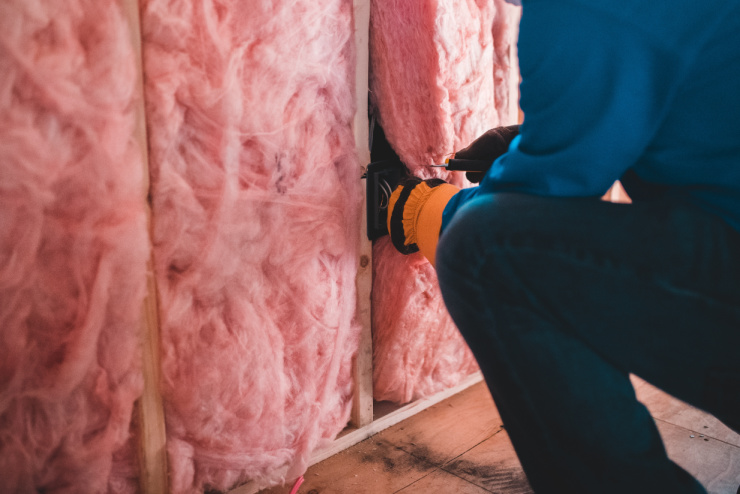While it may not be the most exciting or glamorous topic, insulating your attic can have a profound impact on both your wallet and the overall comfort of your living space. This comprehensive guide will delve into the benefits of having proper insulation in your attic and why it should be a top priority for any homeowner.
Why Insulate the Attic?
Insulating your attic may initially seem like a daunting task. However, the numerous benefits it presents are well worth the effort. Not only does it contribute to the overall comfort and efficiency of your home, but it also reduces energy costs and impacts the environment positively.
Energy Efficiency
Insulating your attic helps reduce the amount of energy you use to heat or cool your home. This is because insulation acts as a barrier, preventing heat from leaving in the winter and entering in the summer. Consequently, your heating and cooling systems will work less, resulting in a significant decrease in energy consumption and utility bills.
Enhanced Comfort
A well-insulated attic ensures consistent temperatures throughout the house. Without insulation, heat and cold air can enter your living spaces causing uncomfortable temperature fluctuations. With proper attic insulation, you will experience a comfortable, climate-controlled environment all year round.
Environmentally Friendly
By reducing your energy usage, attic insulation also minimizes your carbon footprint. Less energy consumed means fewer carbon emissions, contributing to the overall health of the planet. Investing in attic insulation is, therefore, an environmentally responsible decision every homeowner should consider.
Increased Home Value
Finally, attic insulation can significantly increase your home’s resale value. Potential buyers appreciate energy-efficient homes as they foresee the cost savings in utility bills. Therefore, insulating your attic can be a worthwhile investment if you plan to sell in the future.
Improved Air Quality
An often overlooked benefit of insulating your attic is the improvement in indoor air quality. Insulation acts as a barrier, blocking outdoor pollutants such as dust and allergens from entering your home. This can be particularly beneficial for those with allergies or respiratory conditions, who will notice a marked improvement in their symptoms.
Longevity of HVAC Systems
Insulated attics can help extend the lifespan of your heating, ventilation, and air conditioning (HVAC) systems. Without insulation, these systems have to work much harder to maintain a constant, comfortable temperature, which over time can lead to wear and tear, and ultimately, system failure. A well-insulated attic eases this strain, meaning your HVAC systems don't need to work as hard, and will therefore last longer.
Noise Reduction
Insulation has excellent sound-absorbing properties, so installing it in your attic can dramatically reduce the level of noise transmitted from outside. This creates a quieter, more peaceful living environment, particularly beneficial in areas with high levels of traffic or other sources of noise.
Attic Insulation: Best Solutions
Choosing the right insulation for your attic is crucial to maximize the benefits mentioned above. With the myriad options available, it can be hard to decide which material is most suitable for your needs. Let's explore some of the best solutions for attic insulation.
Spray Foam Insulation
Spray foam insulation is an excellent choice for attic spaces. It expands to fill gaps and cracks, providing an airtight seal that significantly reduces heat transfer. While it can be more expensive than other options, its high R-value (a measure of insulation's thermal resistance) and durability can provide long-term cost savings.
Fiberglass Batt Insulation
Fibreglass batt insulation is a common, cost-effective solution favoured by many homeowners. It comes in pre-cut panels, which makes it relatively easy to install. However, it requires careful placement to avoid gaps and overlaps, which can undermine its effectiveness.
Cellulose Insulation
Made from recycled paper, cellulose insulation is an environmentally friendly option. It's treated with fire-resistant chemicals and offers good thermal performance. It can be installed using a blow-in method, which fills the attic space thoroughly, leaving fewer gaps.
Radiant Barrier Insulation
Ideal for hot climates, a radiant barrier reflects heat away from your home, reducing the amount of heat transferred from the roof to the attic. This type of insulation can be especially effective in reducing cooling costs during the summer months.
Mineral Wool Insulation
Mineral wool insulation is made from natural materials and is highly fire-resistant. It also exhibits excellent sound-absorbing properties, making it a good choice for homeowners looking to reduce noise levels in addition to improving thermal efficiency.
Loose-Fill Insulation
Another viable option is loose-fill insulation. Made from small particles of fibre, foam, or other materials, loose-fill insulation is ideal for attics with irregular joist spacing or numerous obstructions. It can be installed using a blow-in method, effectively covering the entire attic space.
Reflective Insulation
Reflective or foil insulation works by reflecting radiant heat, making it particularly useful in hot climates. It's typically installed in the attic rafters, offering a reduction in cooling costs.
Tips for Installing Attic Insulation
- R-Value: Always consider the R-value of insulation materials. The higher the R-value, the greater the insulation capabilities.
- Seal Air Leaks: Before installing insulation, ensure to seal all air leaks in the attic. This prevents warm or cool air from escaping, enhancing the effectiveness of the insulation.
- Wear Protective Gear: Insulation materials can be irritating to the skin and lungs. Always wear protective gear, including gloves, a mask, and long sleeves, while installing insulation.
- Avoid Blocking Vents: It's crucial not to block soffit vents when adding insulation, to prevent moisture buildup and maintain good ventilation.
- Hire a Professional: If you're unsure about installing insulation yourself, consider hiring a professional to air seal your attic. This ensures the job is done right, maximizing the benefits of your attic insulation.
Remember, choosing the right insulation for your attic is a significant step towards energy efficiency, increased comfort, and potentially significant savings on your energy bills. However, it's crucial to consider your specific needs, the climate you live in, and the construction of your home before making a decision.
*Collaborative post








No comments